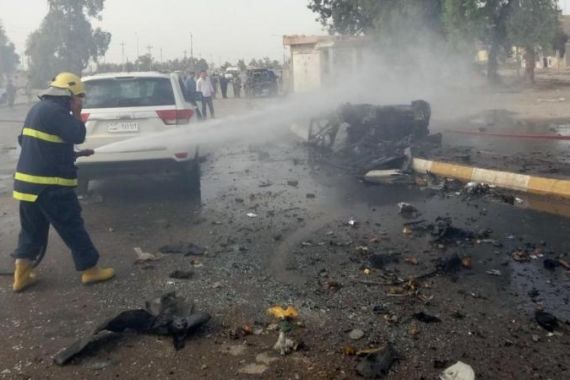Wave of bombings rocks Iraqi cities
Bombings in Baghdad, Kirkuk and Samara leave at least 35 people dead and dozens injured in worst violence in weeks.

A series of attacks have rocked 10 cities across Iraq including Baghdad, Kirkuk and Samara.
The deadly explosions on Thursday included 14 separate car bombings which have left 35 people dead and more than 100 others injured.
Keep reading
list of 4 items‘Mama we’re dying’: Only able to hear her kids in Gaza in their final days
Europe pledges to boost aid to Sudan on unwelcome war anniversary
Birth, death, escape: Three women’s struggle through Sudan’s war
In the capital, police said roadside bombs and car explosions targeted security patrols and Hamad Amin, the health minister, was injured as his convoy was driving him to work.
Al Jazeera’s Jane Arraf, reporting from Baghdad, said: “The blasts were a series of co-ordinated attacks in Baghdad and northern cities but mostly within Shia neighbourhoods.”
“All of this, officials say, fits a pattern linked to al-Qaeda, and that pattern is attacks on security installations, attacks on Shias, with the intent of showing that security forces can’t keep Iraqis safe and showing as well that the campaign to restart sectarian violence in Baghdad and in other places is still going strong,” said Arraf.
At least three improvised explosive devices (IEDs) went off in the neighbourhoods of al-Amel, southwestern Baghdad, and Taji, north of Baghdad, killing nine people and injuring 11, a police source told Al Jazeera.
In al-Ghazaliya district, in western Baghdad, an IED exploded as two gunmen were setting it up. Both gunmen were killed, the police source said.
Police also said two car bombs went off in Kirkuk, 290km north of Baghdad, killing nine people and injuring 24 others.
In Samara city, north of Baghdad, two car bombs resulted in three people killed and six others injured.
Political fallout
Sunni and Kurdish parliamentarians blamed the Shia-led government and its attempts to dominate Iraqi politics for the violence.
The minority politicians said the bombings probably were the result of months-long political impasse that has all but paralysed Iraq’s government since the US military withdrawal at the end of last year.
“The deterioration in the security situation is a result of the differences between the political powers,” said Sunni legislator Hamid al-Mutlaq, a member of parliament’s defence and security committee and frequent critic of the government of Nouri al-Maliki, the prime minister.
The Sunni-backed Iraqiya bloc blamed inadequate security measures for the intensity of the attacks. As head of the armed forces, Iraqiya said, Prime Minister Nouri al-Maliki shoulders the blame for the deficient security apparatus.
The Islamic State of Iraq (ISI), the name for the Iraqi branch of al-Qaeda, has claimed responsibility for the attacks.
The group said it targeted security forces and government officials in “response to the campaign of detaining, torture, embargo and confiscation of lands of Sunni people, especially in Baghdad and its outskirts”, a statement on the group’s website read.
The group said the morning wave of bombings was just the beginning of what would be a prolonged series of attacks.
“We assure you that this invasion is the beginning of what is waiting for you in the next days, and one phase in a blessed series that has been launched, and will not stop until God judges between us” and the Shia, the statement said.